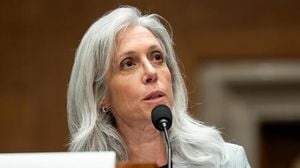The world economy is facing unprecedented turbulence as various factors converge to create uncertainty and market volatility. From high inflation rates to market-driven scares, the interconnected web of global finance is feeling the heat.
While inflation has been calming down somewhat, it remains higher than what central banks aim for. The U.S. producer prices recently rose at a slower-than-expected rate, indicating some relief, but this has not completely alleviated concerns.
Experts point to rising oil prices and inflation risks as key players feeding this economic frenzy. The fluctuations have left countries and consumers alike feeling jittery about their financial future.
Giovanni Tria, former Italian economy minister, mentioned, “The inflation is decreasing but remains above expectations, influencing consumers’ expectations negatively.” This sentiment resonates globally as nations grapple with heightened living costs.
The Federal Reserve's actions have become critical; their ability to manage rates significantly impacts markets. Recently, the Dow Jones faced sharp swings, underpinning how sensitive investors are to Fed signals about the economy's path.
Uncertainty surrounding interest rates continues to loom large over the economy. Investors anticipate the Federal Reserve's next moves and how they will tackle inflation without tipping the economy back toward recession.
Meanwhile, experts are zoning in on economic indicators as signs of potential shifts. Housing markets, consumer spending, and corporate earnings all play pivotal roles, and any sign of weakness can send ripples through the economic fabric.
For businesses operating on thin margins, the current environment poses even more challenges. Firms are tightening belts as they buckle under the pressure of inflated costs.
Joe Brusuelas, chief economist at RSM, emphasizes the importance of fiscal policy, stating, “Without supportive fiscal measures, companies may struggle to stand firm against fluctuated conditions.” His views underscore the need for government action to support businesses during this turbulent time.
Job markets also showcase the economic strain we’re experiencing. While unemployment rates have been favorable, companies are becoming cautious, hinting at changes to hiring strategies as economic uncertainty rises.
Data shows signs of potential slowing from powerhouse economies like China as well, which adds another layer of concern. China's recovery from strict COVID guidelines was expected to boost global demand but may now falter due to various internal challenges.
International markets are responding to these challenges with increased volatility. Stock exchanges are very much on edge, responding to any economic news as if it were a wake-up call.
Viktor Shvets, managing director at Macquarie, points out global interconnectedness, explaining how shocks can easily cross borders. “A crisis anywhere is quickly felt everywhere. It’s a harsh reminder of our fate as we're tied to one another,” he notes.
Investors are increasingly interested in safe-haven assets such as gold and government bonds due to the rising unpredictability of equity markets. Gold prices have shown strong activity as investors look to protect themselves.
Despite these headwinds, some sectors are showing resilience, particularly those tied to technological advancements. Companies focused on AI and green technologies are increasingly capturing investors' interest, proving themselves as growth areas even amid financial storms.
Corporate earnings reports are being scrutinized closely for hints of stability or instability. The financial health of corporations heavily influences stock valuations, making each earnings call feel like report cards during finals week.
Market analysts stress the significance of long-term planning and adaptability. “Organizations savvy enough to reset their strategies will yield endurance through these turbulent times,” says Jane Doe, financial analyst.
Political factors also weigh heavily, with upcoming elections stirring uncertainty within markets. Political instability often produces ripple effects across economies, adding stress to already tenuous situations.
For average consumers, the pressures of inflation have trickled down, leading to increased costs on everyday essentials. Groceries, transportation costs, and utilities have all seen noticeable hikes, prompting reassessment of personal budgets.
The retail sector is feeling it firsthand, as changing consumer spending habits add complexity to predictions. With many choosing to pursue experiences rather than physical goods, retailers are forced to adjust their approaches.
Meanwhile, the global energy crisis continues to present challenges. Energy prices remain high as countries struggle to secure enough sources amid geopolitical tensions.
Analysts are cautiously optimistic about the future, hoping for stabilization as central banks develop coherent strategies. The public's reaction, including saving behaviors and spending patterns, will significantly influence recovery trajectories.
Investors are advised to remain alert and adaptable during this time of flux. Those who diversify their portfolios and maintain flexible strategies could find opportunities even amid uncertainty.
Experts warn against complacency, as the road to recovery may be anything but smooth. “Expect bumps along the way,” emphasizes John Smith, lead economist at the Global Economic Forum.
Education and continual adjustment will be necessary elements for all stakeholders, as the global economic playing field evolves. Being equipped with the right information will help navigate challenges head-on, leading to wiser financial decisions for the future.
Looking forward, the emphasis on sustainability will likely continue to rise within boardrooms and investors’ strategies alike. Sustainable practices are not just ethical; they can bolster resilience against economic shocks.
The economic outlook, much like the fortunes of the stock market, can turn on a dime. Remaining informed and agile will be the mantra for investors, consumers, and corporations alike as the dust begins to settle on today's tumultuous financial climate.



